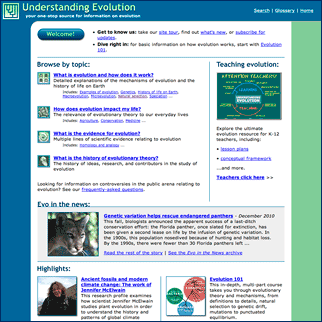
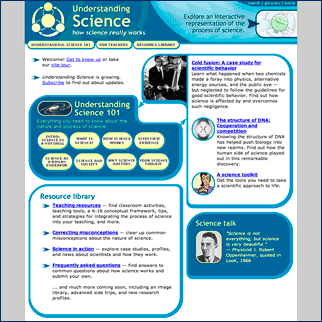
Left: The Understanding Evolution home page. Right: The Understanding Science home page.
2010 ends on a very positive note for UCMP:
A website award and a collections grant!
The SPORE award
Keeping a secret for a full year is no easy task, especially when it would have been to our advantage to mention that both the Understanding Evolution (UE) and Understanding Science (US) websites were winners of the prestigious Science Prize for Online Resources in Education — the SPORE award. Roy Caldwell and Dave Lindberg, as Co-PIs for the projects, first heard the good news by email in December 2009, but it was not until our article was published in the December 24, 2010, issue of Science that the open smiles and celebrations were possible. Needless to say, we are extremely pleased by this recognition and have spent some time reflecting on the reasons for the success of the websites.
 |
 |
|
Left: The Understanding Evolution home page. Right: The Understanding Science home page. |
||
The journey for UE began in 2000 when UCMP hosted the National Conference on the Teaching of Evolution (NCTE). Now known as "the conference with legs" due to the ongoing collaborations initiated at that meeting, NCTE brought together more than 45 scientific, educational, and media organizations to discuss how to better support evolution education. Lack of good teaching resources was one of the identified needs and led to a successful proposal to the National Science Foundation (ESI-0096613) to build a resource for K-12 teachers to increase their content knowledge, confidence, and access to resources that would, in turn, improve their teaching of evolution. With additional funding from the Howard Hughes Medical Institute, the initial site immediately expanded to include materials for K-12 students and the general public, and UE launched in 2004.
Since that time, the site has continued to expand and attract a large, international audience, averaging more than 1.2 million pages accesses each month during the academic year. Partnerships with other universities have resulted in translations in Spanish, Turkish, and Tibetan, and others are underway. We continue to add new features based upon audience input, offering a monthly feature called Evo in the News, research profiles, case studies, and interactive investigations, all of which help to reinforce the relevance of evolution and the science of evolution. With an additional NSF grant (DUE-0918741), we are currently undergoing another expansion to provide resources to support undergraduate teaching. This grant will also allow an upgrade to our navigation system and access to new resources such as an image library, access to labs using real datasets, and the inclusion of an interactive syllabus that connects instructors to slide sets that encourage the integration of evolution throughout the biology curriculum.
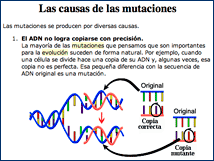 |
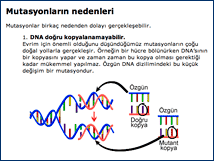 |
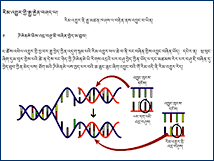 |
||
An excerpt from Understanding Evolution's "Evolution 101" as it appears in, from left, the Spanish, Turkish, and Tibetan translations. Click on any of the images to see an enlargement. |
||||
With a focus on evolution education, the journey has not been free of challenges, and during the process, it became increasingly clear to us that some of the confusions about evolution were similar to confusions about climate change, conservation issues, etc. The problem was really with a poor public understanding of science and how it works — thus the development of Understanding Science (NSF-EAR-0624436), which launched in 2009. Barely two years old, this site provides resources that shift the paradigm from teaching science as a set of facts or a rigid, linear method to one that better reflects how science is really done. By focusing on science as a dynamic and iterative process, we hope to better engage students and the general public with science, its relevance to their lives, its importance to society, and ultimately, the realization that evolution is good science.
Much of the success of these sites lies in (1) the active role of teachers (our primary target audience) in their development, (2) a full-team approach, and (3) extraordinary collaborations. In both cases, we brought together the necessary scientists, science educators, teachers, writers, and Web designers to inform content and design from start to finish. Through the various phases of development for UE, we have had invaluable input from 40 advisors from 30 institutions representing 14 states. For US, there are 35 advisors from 30 institutions and 14 states. Project partners include the National Center for Science Education, the National Evolutionary Synthesis Center (NESCent), and the American Institute of Biological Sciences. As a result, this award belongs to a huge number of people, who respond to review requests, check facts, add new ideas, suggest resources, and generally encourage.
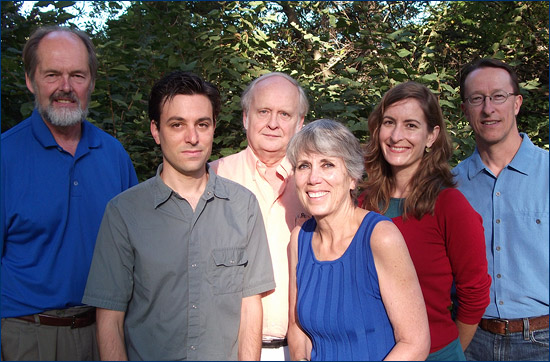 |
The UCMP team from left to right: Roy Caldwell, Josh Frankel, Dave Lindberg, Judy Scotchmoor, Anna Thanukos, and Dave Smith. |
UCMP is dedicated to maintaining these important educational resources, which ultimately will contribute to a more scientifically literate society. We are extremely grateful to those who have offered financial support toward their sustainability.
Read the UCMP education and outreach team's essay about Understanding Evolution and Understanding Science on the Science website.
Team photo by Molly Wright